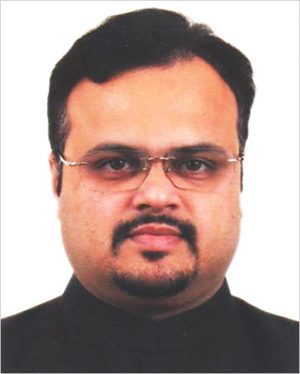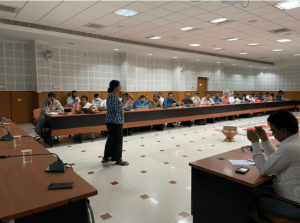
The state of Gujarat has one of the most well-resourced and capable education systems in the country, with strong institutions in areas such as pedagogy and technology. In recent years, the government has undertaken a range of measures to improve student learning outcomes. This was reflected in the latest Annual Status of Education Report (ASER 2018), where the state’s results showed an improvement from previous years. However, there is still a long way to go. Nearly 67% of class 3 students cannot read a class 2 level text, while close to 75% cannot do subtraction.
Perhaps taking note of this, the Gujarat government has recently shifted its focus to foundational learning. As Dr. Vinod Rao, Secretary, School Education, explains, what this means is that the system is working to ensure that no child goes into class 3 without achieving a minimum level of proficiency in reading, writing and numeracy. We asked Dr. Rao why this goal matters, and what his vision is for the state to achieve through this approach.
CSF: What do you see as the biggest challenge for education in your state? Recently, the Gujarat government has decided to focus on the issue of foundational learning. Why do you believe this is important? How can it help address these challenges and improve the quality of education in the state?
Dr. Rao: Gujarat has a strong and well-established education system. Yet, there is not enough accountability for learning. We conducted a state-wide assessment in 2018, Gunotsav, which revealed that over 2 lakh students in classes 6 to 8 were lagging behind because they could not properly read. We then launched Mission Vidya for these ‘priy balak’ (slow learners), to improve their basic literacy and numeracy skills. However, this clearly showed that if children don’t grasp the basics in primary classes, they will struggle to catch up in later classes because they are unable to follow instruction. If the problem is tackled at the first step itself, we can prevent it from growing into a crisis. The key is to focus on early learning, so that all children at least have the right foundation. This is something on which their future learning rests, so it is really a non-negotiable.
If the problem is tackled at the first step itself, we can prevent it from growing into a crisis.
CSF: Please share with us a few of the key initiatives that the Ministry of Education, Gujarat has initiated around foundational learning.
Dr. Rao: We have decided that no child will go into class 3 without achieving a minimum level of proficiency in reading, writing and numeracy. The state is already running a number of programs to improve the quality of school education. We are in the process of further strengthening these programs and making them more rigorous to focus on learning outcomes. For instance, we will be scaling a school readiness program for class 1 students that was piloted last year. Many children lack sufficient preschool education, so this program helps to prepare them as they begin formal schooling.
We conducted a census assessment of 6,45,000 children in the state to measure learning levels in grade 2. This has helped us understand the current status of learning, according to which we can then take corrective measures such as improving pedagogy and teacher support to enhance student learning. We have already initiated an accelerated learning program (an intensive remedial learning program), where we gave special training to teachers to achieve clear goals in 60 days and developed workbooks for students, to enable them to better learn language and mathematics.
I am also a big believer in leveraging technology to establish accountability. We are creating a state-of-the-art Command and Control Centre for continuous monitoring, data collection and data analytics, which will directly impact policies and decision-making. Daily calls are being made to BRCs (Block Resource Coordinators), CRCs (Cluster Resource Coordinators) and schools to track progress. We also monitor online daily attendance of teacher and students. In fact, this began in November last year and we have already seen improved attendance in schools as a result.

CSF: Any best practices or examples you are referring to while finalizing your plans for foundational learning.
Dr. Rao: There is evidence from across the world, including from developing countries, that points towards the possibility of achieving significant gains in learning within relatively short intervention windows. We are looking at all these examples, to learn from their programs and see what can work in the Indian context. I have studied Tusome program of Kenya, which has produced good results over a period of time. It is a good example of a scalable early learning program that’s been successfully running for a few years now. There is similarity in the school systems of Gujarat and Kenya, such as the number of schools, the socio-economic background, etc. We are working with experienced partners to help us identify best practices, which we can then modify keeping in mind the requirements of Gujarat’s education system.
CSF: What is the role of the system in reform efforts? What are the essential elements that should be in place at a system level, for any quality-focused educational reform effort to work well and succeed?
Dr. Rao: System involvement is key for any reform effort to achieve its goals. Every child can and should learn – it is the system’s responsibility to make this happen, not just teachers or parents or social organizations. So, it is important for everyone who is a part of the system to take ownership of the goal and truly believe in it. We need to measure learning so that everyone in the system knows what learning looks like, and we need to establish accountability to ensure that those measures are being achieved. Regular collection and monitoring of data allows the system find out when things are not working and take timely corrective action.
The ‘Gujarat model should become a case study to show that learning can happen when the entire system is oriented towards achieving foundational learning…
CSF: What in your opinion is the best way to identify and solve the underlying causes of the learning crisis? How equipped are districts to identify and troubleshoot the problems? What processes already exist, and what systemic changes need to be made to build this capability at the local level?
Dr. Rao: Causes pertaining to low learning outcomes should be identified at the local level and the people at that level should be equipped with the necessary mindset and resources to address these challenges. It is hard to find a common solution to all the problems; nevertheless, we can clear some roadblocks by right provisioning and data-driven decision-making.
Our districts in Gujarat are well-equipped both in terms of human and financial resources. We have people all the way down to the cluster level. I think what we need to do is build their capacity with skills such as coaching, facilitation, data analysis and planning in order to help them support teachers in improving foundational learning. Districts should set targets for learning and provide all required support to schools through their block and cluster structure. We need to build genuine academic leadership at the district level by enabling BRCs (Block Resource Centres) and CRCs to provide enough support to teachers – this can be done by better planning their time through data-based decision-making. We have already taken some steps, which hopefully will improve the status of academic support in the state.
I keep saying this and I firmly believe that we have the resources, but need the right mindset, skill and direction to build this capability. We need to define the role of each person at the district level, set high expectations, and provide enough support to help them achieve the targets. We need to shift the way districts see their role in academic support. We are moving in that direction, which will become more evident as we go deeper in our approach towards effective implementation at every level.

CSF: What do you want Gujarat to achieve in next 4-5 years through these efforts?
Dr. Rao: Like I said, the existing system is capable of solving the learning crisis. What we want is for Gujarat to become an example nationally as well as internationally, on how to successfully achieve large improvements in learning outcomes through effective models of scalable and sustainable initiatives. The ‘Gujarat model’ should become a case study to show that learning can happen when the entire system is oriented towards achieving foundational learning, through better utilization of the budget and more efficient use of the system. Our goal is not incremental change, but transformation of the education system.



